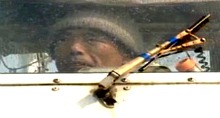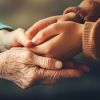What does the earthquake in Japan and Jesus' journey into Jerusalem that final time have in common? Jesus and his disciples were about to face a tsunami of incredible hostility and the earthquake of his own death and ultimate resurrection. Despite his apparent welcome by the people with the triumphal entry, Jesus knew the earthquake and tsunami wave of the rejection, trials, abandonment, torture, and crucifixion were about to occur. Yet as he prayed for deliverance, he said to the Father, "Not my will, but your will be done" and then went off to face the tsunami head on. Rubel's article takes on even more power and poignancy for me as I think about the events leading up to Jesus' crucifixion and ultimate resurrection. Be blessed and think deeply about both as you read the following! -PWare
It has been over a month now since a powerful magnitude 9.0 earthquake and tsunami devastated Japan. The confirmed death toll is over 13,000 and continues to rise. In the midst of all the horror stories are occasional heroic tales of survival and rescue. One of the most fascinating is that of Susumu Sugawara.
The 64-year-old Sugawara is the owner-operator of a small boat named "Sunflower." After the massive earthquake and in view of the tsunami warnings being broadcast, he had to make a quick decision. Should he head for high ground on his island of Oshima? Should he put his boat to sea and try to ride out the fury? His chose to launch his boat and head for deep water offshore.
"I knew if I didn't save my boat," he told a CNN reporter, "my island would be isolated and in trouble." So he ran to his 42-year-old craft that can hold about 20 people at a time and went full-throttle toward the deadly waves that would kill people whose names and faces he knew. Then he saw the wall of water.
Accustomed to waves ten to twelve feet high, this one was fully 50 to 60 feet high. Sugawara knew that he and his boat could easily wind up at the bottom of the sea. He drove straight for it – "climbing the wave like a mountain," as he put it. And the mountain seemed only to grow bigger and bigger. There was a huge crash of water over him. Only then could he see the horizon. He had survived!
Sugawara made his way back to his now-devastated Oshima. For the month since, he has been a lifeline by making hourly trips to the mainland to ferry people and supplies. If people can help pay for gasoline, he accepts money. If they have lost everything and can pay nothing, he still welcomes them aboard.
I'm no sailor or boat captain. I don't know if the Japanese captain made the reasonable and right decision on that fateful day. I can only report and rejoice at the outcome. He lived through the ordeal and is helping others with a sense of sensitivity to their suffering the rest of us can only admire from a distance.
Here is the lesson from this story for me: Against my hesitation and fear, it makes more sense to ride into the teeth of life's challenges than to run from them.
There is a cash-flow crisis. There is an unexpected problem with a product. A major supplier has failed, or a major customer has bailed. Some executives kick into denial mode or ball up in a fetal position. Their companies fail. Leaders steer right into the problem and act with integrity to name and face the problem.
"You gain strength, courage, and confidence by every experience in which you stop to look fear in the face," said Eleanor Roosevelt. "You are able to say to yourself, 'I lived through this horror. I can take the next one that comes along.' You must do the thing you think you cannot do."
The Psalmists invited us centuries ago to say the following in the face of all of our earthquakes:
God is our refuge and strength,
an ever-present help in trouble.Therefore we will not fear, though the earth give way
and the mountains fall into the heart of the sea,though its waters roar and foam
and the mountains quake with their surging.The Lord Almighty is with us;
the God of Jacob is our fortress.(Psalm 46:1-11 NIV).









Reader Comments
Archived Facebook Comments